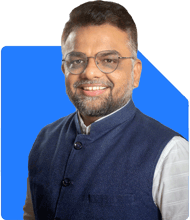Vivek Shah | Answer |Ask -Follow
Financial Planner - Answered on Apr 19, 2024
Shah founded Finrise, a financial planning and wealth management firm, in 2011. He believes that equity investment is the only way to generate long term wealth.
He has an MBA in finance, a degree in chartered accountancy and is a registered life planner from Kinder Institute of Life Planning, USA.... more

I am 25 years old and investing 2k in quant small cap, 2k in Nippon small cap, 1k in parag Parikh flexi, 1k in Motilal Oswal midcap, 1k in HDFC mid cap. Is it good for long term like 30 years. Plz advice me
Your portfolio seems to be well-diversified across different sectors and market caps, which is generally a good approach for long-term investing. Here are a few things to consider:
Performance History: Look at the historical performance of each mutual fund scheme over various time frames (1 year, 3 years, 5 years, and since inception). Compare it with relevant benchmarks and peer group averages to assess how well the fund has performed.
Fund Manager Experience: Evaluate the experience and track record of the fund manager. A skilled and experienced fund manager can significantly impact the performance of the fund.
Expense Ratio: Consider the expense ratio of each mutual fund scheme. Lower expense ratios mean more of your investment returns stay with you rather than being eaten up by fees.
Investment Strategy: Understand the investment strategy of each mutual fund scheme. Make sure it aligns with your risk tolerance, investment goals, and time horizon. For example, small-cap funds tend to be riskier but offer higher growth potential, while flexi-cap funds offer more flexibility in asset allocation.
Asset Allocation: Ensure that your overall portfolio is well-diversified across different asset classes, sectors, and market caps. Avoid overconcentration in any single fund or sector.
Risk Management: Assess the risk management practices of each mutual fund scheme. Look for funds with a disciplined approach to risk management and a focus on preserving capital during market downturns.
Fund House Reputation: Consider the reputation and credibility of the mutual fund house managing the scheme. A well-established and reputable fund house is more likely to have robust investment processes and governance standards.
Regular Review: Regularly review the performance and portfolio composition of each mutual fund scheme. Make adjustments to your portfolio as needed based on changes in your investment objectives, market conditions, and fund performance.
It's also a good idea to consult with a SEBI registered investment advisor who can provide personalized advice based on your financial situation, goals, and risk tolerance. They can help you build a well-structured investment portfolio tailored to your needs.
It's also a good idea to consult with a SEBI registeredinvestment advisor who can provide personalized advice based on your financial situation, goals, and risk tolerance. They can help you build a well-structured investment portfolio tailored to your needs.
You may like to see similar questions and answers below
Samraat Jadhav |2498 Answers |Ask -Follow
Stock Market Expert - Answered on Apr 22, 2024
Samraat Jadhav |2498 Answers |Ask -Follow
Stock Market Expert - Answered on May 02, 2024
Ramalingam Kalirajan |10870 Answers |Ask -Follow
Mutual Funds, Financial Planning Expert - Answered on Jul 11, 2024
Ramalingam Kalirajan |10870 Answers |Ask -Follow
Mutual Funds, Financial Planning Expert - Answered on Jun 13, 2024
Milind Vadjikar | Answer |Ask -Follow
Insurance, Stocks, MF, PF Expert - Answered on Nov 20, 2024
Dr Dipankar Dutta |1836 Answers |Ask -Follow
Tech Careers and Skill Development Expert - Answered on Dec 05, 2025
Ulhas Joshi |280 Answers |Ask -Follow
Mutual Fund Expert - Answered on Dec 05, 2025
Dr Dipankar Dutta |1836 Answers |Ask -Follow
Tech Careers and Skill Development Expert - Answered on Dec 04, 2025
Ravi Mittal |676 Answers |Ask -Follow
Dating, Relationships Expert - Answered on Dec 04, 2025
Anu Krishna |1745 Answers |Ask -Follow
Relationships Expert, Mind Coach - Answered on Dec 04, 2025
Anu Krishna |1745 Answers |Ask -Follow
Relationships Expert, Mind Coach - Answered on Dec 04, 2025
Mayank Chandel |2562 Answers |Ask -Follow
IIT-JEE, NEET-UG, SAT, CLAT, CA, CS Exam Expert - Answered on Dec 04, 2025
Mayank Chandel |2562 Answers |Ask -Follow
IIT-JEE, NEET-UG, SAT, CLAT, CA, CS Exam Expert - Answered on Dec 04, 2025
Mayank Chandel |2562 Answers |Ask -Follow
IIT-JEE, NEET-UG, SAT, CLAT, CA, CS Exam Expert - Answered on Dec 04, 2025
Mayank Chandel |2562 Answers |Ask -Follow
IIT-JEE, NEET-UG, SAT, CLAT, CA, CS Exam Expert - Answered on Dec 04, 2025




























